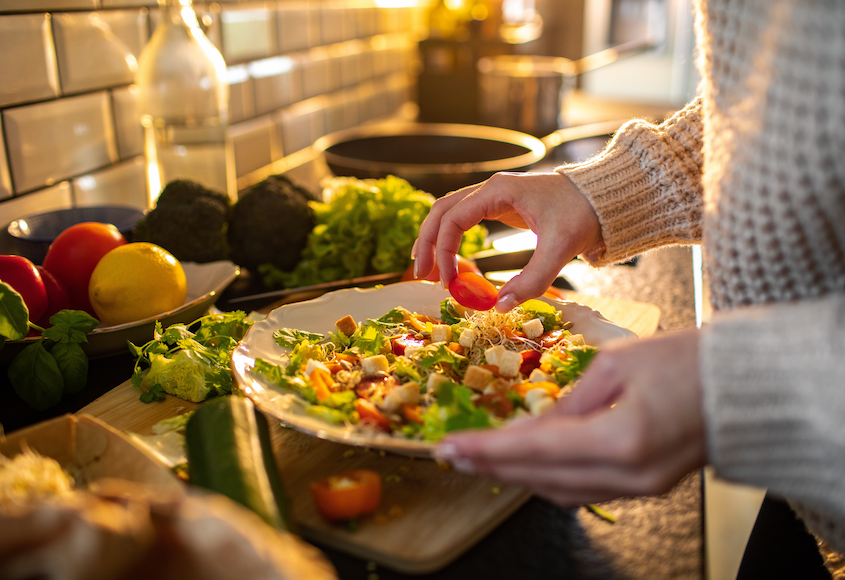What is a Clean Eating Meal Plan & What are the Benefits for Seniors?
Clean eating has gained popularity in recent years as people strive to improve their health and well-being through nutrition. But what exactly is clean eating, and how can seniors benefit from adopting this dietary approach? In this comprehensive guide, we will explore what clean eating entails, its pros and cons, and its potential impact on the health of seniors. So, let’s dive in and discover the world of clean eating meal plans for seniors.
What is Clean Eating?
Clean eating is a dietary approach that focuses on consuming whole, unprocessed foods in their most natural state. The core principle of clean eating is to prioritize nutrient-dense foods while minimizing or avoiding processed and refined products. This means choosing fresh fruits and vegetables, whole grains, lean proteins, and healthy fats over highly processed foods with added sugars, unhealthy fats, and artificial ingredients.
The Basics of a Clean Eating Meal Plan
A clean eating meal plan for seniors should be well-balanced and provide a variety of nutrients necessary for optimal health. Here are some key components of a clean eating meal plan:
- Fruits and Vegetables: Incorporate a colorful array of fruits and vegetables into your meals. These nutrient-packed foods provide essential vitamins, minerals, and dietary fiber that support overall health and well-being.
- Whole Grains: Opt for whole grains like quinoa, brown rice, whole-wheat bread, and oats. These grains retain their natural fiber and nutrients, offering more nutritional value compared to refined grains.
- Lean Proteins: Choose lean sources of protein such as skinless poultry, fish, beans, and legumes. These protein-rich foods are essential for muscle maintenance, tissue repair, and overall body function.
- Healthy Fats: Include sources of healthy fats in your meals, such as avocados, nuts, seeds, and olive oil. These fats are beneficial for heart health, brain function, and nutrient absorption.
- Limited Added Sugars and Sodium: Minimize your intake of foods with added sugars and excessive sodium. Be mindful of hidden sources of sugar in packaged foods and opt for lower-sodium alternatives or natural flavor enhancers like herbs and spices.
- Hydration: Stay hydrated by drinking plenty of water throughout the day. Limit sugary beverages and opt for herbal teas or infused water for added flavor.
The Pros and Cons of Clean Eating
Clean eating offers several potential benefits for seniors, but it’s important to consider the potential drawbacks as well. Let’s explore the pros and cons of adopting a clean eating lifestyle:
Pros of Clean Eating
- Nutrient-Dense Diet: Clean eating emphasizes whole foods that are rich in essential nutrients, promoting overall health and well-being.
- Weight Management: A clean eating meal plan can support weight management by focusing on whole, unprocessed foods that are lower in calories and higher in nutrient density.
- Reduced Risk of Chronic Diseases: Consuming a diet rich in fruits, vegetables, whole grains, and lean proteins can help reduce the risk of chronic diseases such as heart disease, diabetes, and certain types of cancer.
- Improved Digestion: The high fiber content of clean eating promotes healthy digestion and may alleviate common digestive issues such as constipation.
- Increased Energy Levels: Clean eating provides a steady source of energy from nutrient-dense foods, helping seniors maintain optimal energy levels throughout the day.
Cons of Clean Eating
- Restrictive Nature: Some versions of clean eating can be overly restrictive, leading to a limited food selection and potential nutrient deficiencies if not properly balanced.
- Social Challenges: Following a strict clean eating plan may make it more challenging to dine out or enjoy social gatherings where food choices may be limited.
- Potential Over-Thinking: Clean eating can sometimes lead to an unhealthy obsession with food, causing anxiety and distress around meal choices.
- Time and Effort: Preparing clean meals from scratch may require more time and effort compared to relying on processed or convenience foods.
Why is Clean Eating Healthy for Seniors?
Clean eating can be a healthy dietary approach for seniors when implemented with balance and consideration for individual nutritional needs. However, it’s essential to consult with a healthcare professional or registered dietitian before making significant changes to your diet, especially if you have any underlying health conditions or dietary restrictions.
Benefits of Clean Eating for Seniors
- Nutrient Absorption: Aging bodies may experience reduced nutrient absorption. Clean eating, which emphasizes whole foods, can help maximize nutrient absorption and support overall health.
- Weight Management: Maintaining a healthy weight becomes increasingly important as we age. Clean eating, combined with portion control, can help seniors maintain a healthy weight and reduce the risk of obesity-related health issues.
- Heart Health: Clean eating encourages the consumption of heart-healthy foods, such as fruits, vegetables, whole grains, and lean proteins. These choices can help seniors maintain optimal cardiovascular health.
- Brain Function: Certain nutrients found in clean foods, such as omega-3 fatty acids and antioxidants, can support brain health and potentially reduce the risk of cognitive decline and neurodegenerative diseases.
- Digestive Health: Clean eating promotes a fiber-rich diet, which is essential for maintaining a healthy digestive system and preventing constipation, a common issue among seniors.
Considerations for Seniors
While clean eating can offer numerous benefits for seniors, it’s essential to consider individual needs and potential challenges. Here are some factors to keep in mind:
- Nutrient Requirements: Seniors may have specific nutrient requirements due to age-related changes. It’s crucial to ensure that a clean eating meal plan meets these needs, including sufficient protein, calcium, vitamin D, and vitamin B12, for example.
- Medication Interactions: Some medications may interact with certain foods. It’s important to consult with a healthcare professional to ensure that your clean eating plan does not interfere with your medications.
- Chewing and Digestion: Aging can sometimes affect chewing and digestion. Choose clean foods that are easy to chew and digest, and consider modifications or alternative cooking methods if needed.
- Food Safety: Seniors may have a higher risk of foodborne illnesses. Proper food handling and storage practices, such as washing produce, cooking foods to appropriate temperatures, and avoiding expired products, are crucial.
- Personalization: Each senior’s nutritional needs and preferences may vary. Personalize your clean eating plan to suit your taste preferences, dietary restrictions, and cultural considerations.
Building a Clean Eating Meal Plan for Seniors
Now that we understand the basics of clean eating and its potential benefits for seniors, let’s explore how to build a clean eating meal plan tailored to their specific needs. Here’s a step-by-step guide to get you started:
Step 1: Assess Your Nutritional Needs
Before designing a clean eating meal plan, it’s important to assess your specific nutritional needs. Consider factors such as your age, gender, activity level, and any underlying health conditions. Consulting with a registered dietitian can provide valuable guidance in determining your individual nutritional requirements.
Step 2: Plan Your Meals
Once you have a clear understanding of your nutritional needs, begin planning your meals. Focus on incorporating a variety of whole foods from each food group. Aim for a balance of carbohydrates, proteins, and healthy fats in each meal. Consider using the plate method, where half of your plate consists of vegetables, one-quarter is lean protein, and one-quarter is whole grains or starchy vegetables.
Step 3: Grocery Shopping
Create a grocery list based on your planned meals. Prioritize fresh, seasonal fruits and vegetables, whole grains, lean proteins, and healthy fats. When possible, choose organic options for produce on the Environmental Working Group’s Dirty Dozen list to minimize exposure to pesticides.
Step 4: Meal Preparation
Allocate time for meal preparation to ensure you have clean, nutritious meals readily available. Consider batch cooking or meal prepping to save time during the week. Prepare larger portions and store leftovers in individual containers for easy grab-and-go options.
Step 5: Hydration and Snacks
Don’t forget to stay hydrated throughout the day by drinking water. Keep a refillable water bottle handy and aim for at least eight glasses of water daily. Additionally, plan for healthy snacks to curb cravings and keep energy levels stable. Opt for fresh fruits, raw nuts, yogurt, or vegetable sticks with hummus.
Step 6: Mindful Eating
Practice mindful eating by savoring each bite and paying attention to your body’s hunger and fullness cues. Chew your food thoroughly and eat at a relaxed pace. This promotes better digestion and allows you to fully enjoy the flavors and textures of your meals.
Get Help to Make Clean Eating Easy
Chefs For Seniors can take the stress out of healthy meal planning and preparation. Let our skilled personal chefs make meal plans that fit your dietary preferences and needs, grocery shop, and make fresh, delicious meals for you right in your own kitchen!
Conclusion
Clean eating can be a beneficial dietary approach for seniors, promoting overall health, well-being, and disease prevention. By focusing on whole, unprocessed foods and minimizing processed and refined products, seniors can optimize their nutrition and enjoy the benefits of clean eating. Remember to consult with a healthcare professional or registered dietitian before making significant dietary changes, and personalize your clean eating plan to meet your individual needs and preferences. With proper planning and preparation, clean eating can become a sustainable and enjoyable way of nourishing your body in your golden years.
Disclaimer: This article is for informational purposes only and should not be considered medical advice. Always consult with a healthcare professional or registered dietitian before making significant changes to your diet or lifestyle.
References
- https://www.health.harvard.edu/staying-healthy/clean-eating-the-good-and-the-bad
- https://www.mayoclinichealthsystem.org/hometown-health/speaking-of-health/clean-eating-what-does-that-mean
- https://www.heart.org/en/healthy-living/healthy-eating/eat-smart/nutrition-basics/what-is-clean-eating
- https://www.eatingwell.com/article/78846/7-tips-for-clean-eating/



